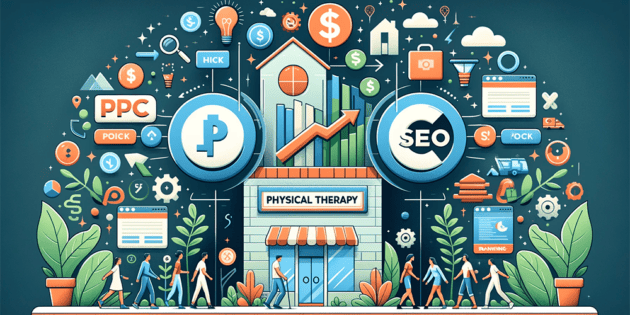When it comes to getting visitors to your website with the goal of converting them into leads, two key strategies often considered are Pay-Per-Click (PPC) advertising and Search Engine Optimization (SEO).
Understanding the fundamental differences between PPC and SEO is crucial for making informed decisions that align with your business goals, particularly when it comes to generating high-quality leads that convert to loyal, high-paying patients.
Pay-Per-Click (PPC) Advertising
What is PPC? PPC is a model of internet marketing where advertisers pay a fee each time one of their ads is clicked. Essentially, it’s a way of buying visits to your site.
Advantages:
- Immediate Results: PPC campaigns can be launched quickly, offering immediate visibility and traffic.
- Targeted Reach: You can target specific demographics, locations, and even times of day.
- Measurable ROI: PPC campaigns offer clear metrics to measure return on investment, such as cost per click and conversion rates.
Disadvantages:
- Cost: Costs can escalate, especially in competitive markets and definitely if campaigns are poorly managed.
- Temporary Visibility: Once you stop paying, your ads disappear, and so does the traffic.
- Clicks vs. Quality: Not all clicks lead to conversions; some may result in low-quality leads.
Search Engine Optimization (SEO)
What is SEO? SEO involves optimizing your website to rank higher in search engine results pages (SERPs), thereby increasing the quantity and quality of organic (non-paid) traffic to your site.
Advantages:
- Long-term Results: Once established, SEO can provide continuous traffic.
- Credibility and Trust: High rankings can enhance the credibility of your business.
- Cost-Effective: Apart from initial optimization costs, SEO does not require payment for clicks.
Disadvantages:
- Time-Consuming: It takes time to see results from SEO efforts.
- Ongoing Effort: SEO is not a set-it-and-forget-it strategy; it requires continuous work and updates.
- Algorithm Changes: SEO tactics must evolve with frequent changes in search engine algorithms.
Which Produces the Best Leads?
Quality vs. Quantity:
- PPC can generate a high volume of leads quickly, but these leads may not always be of high quality.
- SEO tends to attract more informed users, as they actively search for specific services, potentially leading to higher quality leads.
Conversion Potential:
- Leads from SEO efforts often have higher conversion rates, as they are based on organic search intent.
- PPC can also drive conversions, especially with data-driven properly-targeted campaigns
Cost-Effectiveness:
- SEO is often more cost-effective in the long run but requires patience and consistent effort.
- PPC offers immediate results but at a potentially higher and ongoing cost.
Conclusion
The choice between PPC and SEO depends on your business objectives, budget, and timeline. For immediate visibility and traffic, PPC is effective but can be costly. SEO is a long-term strategy that builds credibility and sustainable traffic but requires patience and ongoing effort. Often, a balanced approach incorporating both PPC and SEO is the most effective strategy for physical therapy businesses aiming to attract high-quality leads that convert to loyal, high-paying patients.
Continual monitoring and adjusting your strategies based on performance data will help you maximize the return on your digital marketing investments.
If you have questions about either PPC or SEO please reach out to flemming@directresponsept.com or click the link below:
Click here to schedule a free Marketing Discovery Call >>
☝️ This would be an informal and NO-OBLIGATION, NO-PRESSURE, NO-SELLING, 1-to-1 chat to figure out what’s going on with your marketing and how it could be improved 👍








